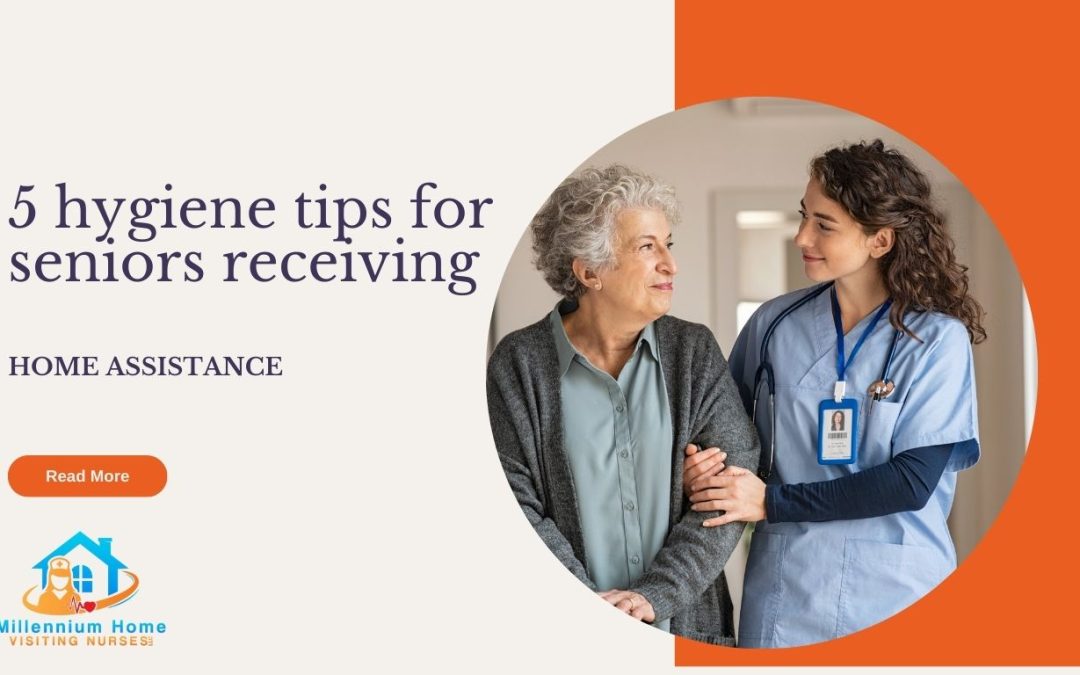As seniors age, the ability to maintain personal hygiene can become more challenging. Reduced mobility, medical conditions, and memory loss often make routine self-care difficult. That’s why families rely on professional caregivers and home health aides to provide support with daily hygiene while respecting their loved one’s dignity and independence.
Hygiene Tips for Seniors Receiving Home Care
Proper hygiene not only contributes to physical well-being but also improves emotional comfort and social confidence. For seniors receiving home assistance, having a practical hygiene routine in place makes a real difference in health outcomes and quality of life.
Below are five essential hygiene tips tailored for older adults receiving in-home care, along with insights on how trained caregivers can offer meaningful assistance.
Why Hygiene Matters More with Age
As the body ages, immune response weakens. What once was a minor irritation can now develop into a more serious condition if not addressed early. Seniors are more vulnerable to skin infections, urinary tract infections, dental issues, and respiratory illnesses, all of which can be triggered or worsened by poor hygiene.
For individuals receiving home assistance, daily hygiene care also becomes a matter of preserving self-worth. Feeling clean, fresh, and well-groomed supports emotional well-being and makes seniors feel more comfortable interacting with others.
Professional caregivers play an important role in this process, helping with hygiene tasks that may be physically or cognitively difficult, while maintaining a respectful and supportive presence.
1. Encourage Consistent Hand Washing
Hand hygiene is the foundation of infection control, especially important in senior care where even mild illnesses can cause serious complications.
Caregivers should encourage handwashing:
- Before meals
- After using the bathroom
- After coughing or sneezing
- After touching pets
- After any outdoor activity or contact with others
Using gentle soap and warm water for at least 20 seconds is ideal. When mobility is limited, hand wipes or alcohol-based sanitizers (with caregiver guidance) may be helpful. Caregivers should offer reminders, assist when needed, and ensure that handwashing supplies are easily accessible.
2. Maintain Oral Health with Daily Routines
Dental hygiene is sometimes overlooked in home care settings, but it’s crucial. Poor oral care can lead to infections, difficulty eating, and even cardiovascular problems.
Here’s what a basic oral care routine should include:
- Brushing teeth (or dentures) twice a day with a soft-bristled toothbrush
- Flossing once daily, or using dental picks or water flossers if manual dexterity is an issue
- Cleaning dentures thoroughly and soaking them overnight
- Rinsing with antibacterial mouthwash (if recommended by a dentist)
Seniors may need help brushing or cleaning hard-to-reach areas. A caregiver’s gentle assistance, along with periodic dental checkups, can go a long way in preserving oral health and preventing discomfort.

3. Support Regular Bathing and Skin Care
Bathing helps prevent skin infections, body odor, and discomfort. However, for seniors with limited mobility or fear of falling, it can become a stressful task. That’s where trained home caregivers become essential.
Safe and effective bathing practices include:
- Bathing 2–3 times per week to avoid skin dryness
- Using mild, fragrance-free soap and moisturizing lotion
- Installing grab bars, shower chairs, and non-slip mats
- Offering assistance while respecting personal space and modesty
After bathing, skin should be patted dry and moisturized to prevent cracking and itchiness. Caregivers should also be attentive to pressure points and folds in the skin, looking for early signs of rashes or pressure sores.
4. Promote Clean Clothing and Bedding
Clothing, towels, and bed linens often accumulate sweat, skin cells, and bacteria. If not changed regularly, they can lead to skin irritations, unpleasant odors, and infections.
A simple routine can include:
- Changing undergarments and clothing daily
- Washing bedding at least once a week, or more often if needed
- Keeping a supply of clean, season-appropriate garments within reach
- Separating soiled clothes promptly to avoid odors
Caregivers can assist by organizing closets, helping with laundry, or dressing assistance. When seniors are involved in selecting their clothes or folding laundry, it also helps them feel active and engaged in their care.
5. Don’t Overlook Nail and Foot Care
Fingernails and toenails can become thick, brittle, or overgrown with age. Left untreated, this may cause pain, infections, or difficulty walking.
Foot care is especially critical for seniors with diabetes or circulatory issues.
Key aspects of hand and foot hygiene include:
- Trimming nails straight across to prevent ingrown nails
- Filing rough edges to reduce snagging and scratches
- Washing and thoroughly drying feet (especially between toes)
- Applying foot cream to keep skin soft and crack-free
- Using clean socks and breathable footwear daily
Caregivers should watch for signs of redness, swelling, or fungal infections. In such cases, a visit to a podiatrist or medical provider is recommended.

Role of Professional Home Care in Maintaining Hygiene
At Millennium Home Visiting Nurses, our caregivers are trained to assist seniors with every aspect of personal hygiene, always with patience, respect, and a focus on comfort. Whether it’s helping a client brush their teeth, assisting with a bath, or simply reminding them to drink water, we approach each task with compassion.
We create customized care plans for every individual, taking into account their physical limitations, medical history, and personal preferences. Our licensed aides can provide full support with:
- Bathing and dressing
- Toileting and continence care
- Mobility assistance
- Oral hygiene and grooming
- Light housekeeping and laundry
Hygiene support is just one part of our broader mission to keep seniors safe, healthy, and happy at home.
Final Thoughts: Building a Routine that Respects Dignity
Maintaining hygiene in later life goes beyond physical cleanliness. it’s about preserving confidence, independence, and self-respect. With the right assistance and a thoughtful routine, seniors can continue to feel like themselves while staying safe and well cared for.
Families should look for signs when extra support may be needed:
- Avoiding showers or baths
- Unusual body odor
- Skin rashes or dental discomfort
- Wearing the same clothes repeatedly
By involving professionals like those at Millennium Home Visiting Nurses, families can ensure that their loved ones receive attentive, dignified care without compromising their comfort or privacy.


Recent Comments